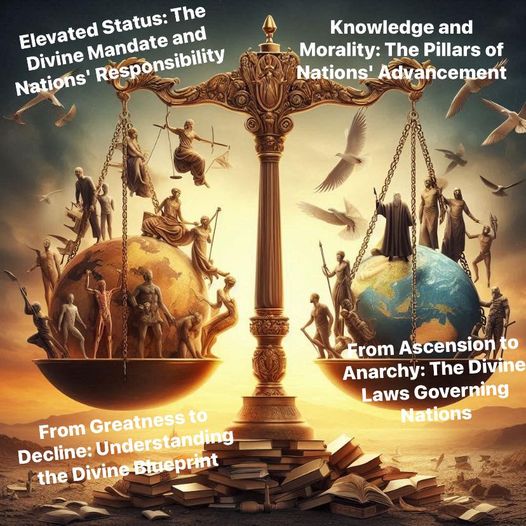
Because the world serves as a crucible for trials and tests, governed by both physical and moral laws, the Divine has ordained a pattern of raising nations through historical processes. Just as individuals are born into predetermined circumstances, endowed with unique abilities, and traverse stages from infancy to old age, nations are similarly chosen and elevated by the Divine according to a established scheme. This process will persist until the Day of Judgment. Once a nation is elevated, it becomes the responsibility of its people to maintain that elevation.
When the Divine chooses to elevate a nation, the reasons behind such elevation are profound and solely within the domain of the Divine will. Political slogans promising to make a nation great or to create greater nation will not influence a nation’s elevation; it is solely determined by the Divine selection. However, upon closer examination, when a nation rises to prominence or establishes itself on the global stage, the significance of knowledge and morality becomes evident in this process. Knowledge encompasses the ability to effectively utilize the earth’s resources, devise solutions to societal problems, and foster progress. The depth and maturity of this knowledge directly correlate with a nation’s advancement.
Likewise, when contrasting elevated nations with others, we observe the embrace of specific values in their political structures and the establishment of resilient economic frameworks. These achievements stem from human intellect, propelled by an inherent inclination towards understanding and analysis. Consequently, it implies that nations aspiring to uphold their elevated status should promote critical thinking and the freedom of expression.
Knowledge (e.g. scientific knowledge) serves as the cornerstone, while morality constitutes the second pillar of societal elevation. Morality, particularly its collective aspect, significantly influences the rise and fall of nations. It hinges on the honesty and integrity prevalent in trade and dealings, the ethical conduct of individuals, and the fidelity to agreements and contracts.
The Divine chose Prophet Abraham (peace be upon him) and his descendants for a significant purpose, elevating them above other nations. Initially, the descendants of Isaac and Israel were entrusted with safeguarding the monotheistic faith, submitting to the belief in one God. Additionally, Prophet Dawud (David) was bestowed with divine instruction in crafting military attire, as mentioned in the Quran 21:80, to fortify himself in battles. Furthermore, he was empowered to defeat and repel corrupt kings, preventing the spread of anarchy and disorder, as referenced in the Quran 2:251.
This underscores the Divine’s role in overseeing an international order, akin to how nations establish governments to protect their citizens from anarchy. The Almighty ensures that no single or few nations can disturb this order. When nations foster disorder and chaos on the global stage, the Divine intervenes by empowering or elevating other nations to confront and repel such disruptive forces. Thus, this law of repulsion is an integral aspect of the Divine’s practice.
As the knowledge and morality of the children of Israel declined, they struggled to uphold their elevated status. Additionally, their attempt to harm the messenger of the Almighty subjected them to another law, the completion of the proof of truth, which is activated following the rejection of a divine messenger. Consequently, the Divine appointed the descendants of Ishmael to undertake this crucial responsibility. Hence, if you were to ask a Muslim today, they would acknowledge that the children of Israel or Jews were once part of the earlier Muslim community. In this context, ‘Muslim’ refers to those who embrace monotheism and willingly submit to the sovereignty of one God.
Upon examining the aftermath of World War II, it becomes evident that many nations, including the Ottoman, Japanese, and various European empires, experienced a decline in both knowledge and morality. These empires were implicated in genocidal acts, leading to their moral degradation. Additionally, their political systems became compromised, further exacerbating their downfall. From a knowledge perspective, they lagged behind other emerging powers that were subsequently elevated by Divine decree.
Metaphorically, knowledge serves as a guiding star illuminating progress, while morality acts as a sturdy foundation ensuring stability and longevity. Moral principles shape societal interactions, reflecting a nation’s integrity, trustworthiness, and commitment to justice.
In the end, the harmonious interplay of knowledge and morality ensures the preservation of nations’ elevated status, securing their position in the annals of history.

